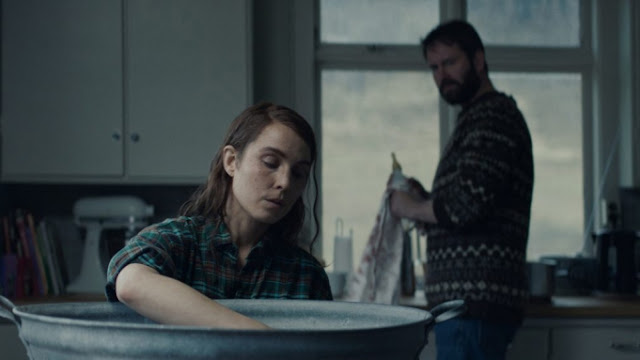Lamb: Movie Review
Cast: Noomi Rapace, Hilmir Snær Guðnason
Director: Valdimar Jóhannsson
Maria and Ingvar (Rapace and Guðnason) live in the isolated hills of Iceland, on a farm, far away from anyone.
A place where the mist rolls in a haunting fashion, where whiteouts clear to show formless shapes trudging through the wilds hills of Iceland's rugged bleak mountains.
It's Christmas, but you wouldn't know to look around Maria and Ingvar's farm - even though their animals' pen has Radio Rekjavik declaring the best of the season, there's no sign of festivities anywhere else. Outside the pen there's a brutish breathing prowling creature, that causes all the sheep and rams to move uneasily and shuffle for safety before one of their number is singled out.
This is the start of Lamb, a film that holds its cards close to its chest, one which toys with folklore, but has at its core a tale of family loss, gradually unveiled as the movie begins to unspool. Elements of the film are teased out from beginning to end, gradually revealing a picture of a relationship between Maria and Ingvar, which is both haunting and effective.
It's true that Lamb may have a confident tone from a first time director, and have an atmosphere of unease that plays much on both the locales used and the discordant soundtrack, but there are large swathes of it when it feels like not much is happening, and the characters aren't quite strong enough to propel the mystery on to its conclusion. Conversations early on include Ingvar telling Maria that experts believe time travel is possible now, hinting at problems in their own past they wish they could tackle. But these are hints dangled from afar, leaving you desperate to connect the dots and reaching for answers that may not immediately be forthcoming.
Answers come a third of the way through the film, and the folklore edges are hinted at early on, but the unspoken dynamic between the couple during lambing sets up the domestic relationship that the film is keen to underscore through furtive looks and hints rather than explicit explanations. An excellent score helps build proceedings to an unnerving crescendo - but never once does the score overpower the relative mundanity of proceedings.
There is something off in the film from the beginning and right to the final frame.
But unlike psychological horrors like Midsommar, Lamb chooses to ground its dynamic with its two leads. Things only truly open up when a third party enters the proceedings, and while it follows an inevitable course, the more you invest in the journey and the revelations when they come, the more you'll get out of Lamb.
It won't be for everyone, which is a shame because Jóhannsson's first time directorial effort is a masterclass of atmospherics and a domestic tale rooted deep in the confines of a very human tragedy. It's evocative, moody, a little magnificent in portions of its scope and guaranteed to hook you in with its sense of something ever-so-slightly off in those hills.





%20&%20Edith%20Poor%20(Lizzie%20Moyle)_%C2%A9BBCS%20&%20Bunya%20Entertainment.jpg)
No comments:
Post a Comment